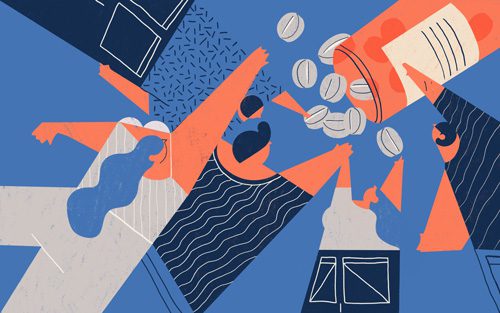Two Public Health Emergencies

Historically, opioid use has been highest in areas with:
- High unemployment
- High levels of food insecurity
- Many people at risk of eviction or foreclosure
- Social isolation
- Increased feelings of anxiety and depression
- Uncertainty about the future
COVID-19 has increased all of these factors across the United States. This puts people who’ve previously never struggled with addiction at risk of developing an opioid use disorder. For those who are currently in recovery, these conditions increase the risk of a relapse.
Social isolation may be the most problematic risk factor associated with COVID-19. Friends and family are often the first to spot the signs of addiction and stress the need for treatment. When individuals are isolated from their loved ones, it becomes harder to recognize the signs of a substance use disorder. Early intervention lets people with addiction get back on track before they experience a “rock bottom” moment, such as being arrested for a substance-abuse-related offense.
Mixing Alcohol and Opioids Increases the Risk of a Fatal Overdose
Alcohol sales rose 55% in the week ending March 21 and have continued to remain high as growing numbers of people drink to self-medicate their anxiety. This causes great concern for researchers, since mixing alcohol and opioids is well-known to increase the risk of a fatal overdose.
Both alcohol and opioids are considered sedatives. Taking both together amplifies each drug’s sedative effects—leading to symptoms such as dizziness, loss of coordination, irregular heart rate, vomiting, and trouble breathing. It’s impossible to predict when a fatal overdose will occur due to differences in individual tolerance levels, but the intoxicated individual will not recognize the symptoms of an overdose on their own.
Naloxone can temporarily reverse an opioid overdose, but it will not treat alcohol poisoning. Someone who has overdosed on alcohol and opioids needs emergency medical care. While most hospitals have not yet seen their ERs overrun by COVID-19 patients, there is still a concern that high levels of coronavirus infections could hamper the ability of healthcare professionals to treat patients with other illnesses or injuries.
Addiction Increases the Risk of COVID-19 Complications
While most people who contract COVID-19 will experience mild to moderate symptoms and make a full recovery, any type of substance abuse increases a person’s risk of developing serious complications when they become ill. Substance abuse damages a person’s immune system, which makes it harder for the body to fight off infections of any type. Since opioids suppress a person’s ability to breathe normally, there is also concern that long-term opioid users may have lung damage that would complicate the healing process if they were to contract COVID-19.
Seeking Addiction Treatment Is the Best Way to Stay Safe
It’s a common misconception among Pennsylvania residents that addiction treatment is unavailable during the COVID-19 coronavirus pandemic. Although many businesses are closed, substance abuse treatment programs such as Mountain Laurel Recovery Center’s residential drug and alcohol addiction treatment program are classified as essential services. We will remain open and available to clients throughout the COVID-19 crisis. We are monitoring the situation closely and are committed to following all CDC recommendations designed to reduce the risk of coronavirus infection.
Mountain Laurel Recovery Center provides a full continuum of care for clients dealing with opioid addiction, including:
- Medically managed detox to rid the body of opioids and other abused substances
- Medication-assisted treatment to reduce withdrawal symptoms, minimize cravings, and promote lasting sobriety
- Individual and group therapy to learn the coping skills necessary for a sober lifestyle
- Family therapy to strengthen the underlying support system
- 12-Step group participation to learn from the experiences of others who’ve built sober lives for themselves
- Cognitive behavioral therapy to address anxiety, depression, and other mental health challenges
- Relapse prevention services
If you’re ready to take the first steps towards a sober future, we’re here to help.
